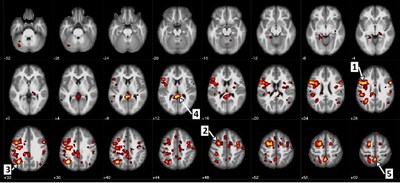YORKTOWN, N.Y. and EDMONTON, Alberta, July 21, 2017 /PRNewswire/ -- IBM (NYSE: IBM) scientists and the University of Alberta in Edmonton, Canada, have published new data in Nature's partner journal, Schizophrenia1, demonstrating that AI and machine learning algorithms helped predict instances of schizophrenia with 74% accuracy. This retrospective analysis also showed the technology predicted the severity of specific symptoms in schizophrenia patients with significant correlation, based on correlations between activity observed across different regions of the brain. This pioneering research could also help scientists identify more reliable objective neuroimaging biomarkers that could be used to predict schizophrenia and its severity.
Schizophrenia is a chronic and debilitating neurological disorder that affects 7 or 8 out of every 1,000 people. Those with schizophrenia can experience hallucinations, delusions or thought disorders, along with cognitive impairments, such as an inability to pay attention and physical impairments, such as movement disorders2.
"This unique, innovative multidisciplinary approach opens new insights and advances our understanding of the neurobiology of schizophrenia, which may help to improve the treatment and management of the disease," says Dr. Serdar Dursun, a Professor of Psychiatry & Neuroscience with the University of Alberta. "We've discovered a number of significant abnormal connections in the brain that can be explored in future studies, and AI-created models bring us one step closer to finding objective neuroimaging-based patterns that are diagnostic and prognostic markers of schizophrenia."
In the paper, researchers analyzed de-identified brain functional Magnetic Resonance Imaging (fMRI) data from the open data set, Function Biomedical Informatics Research Network (fBIRN) for patients with schizophrenia and schizoaffective disorders, as well as a healthy control group. fMRI measures brain activity through blood flow changes in particular areas of the brain. Specifically, the fBIRN data set reflects research done on brain networks at different levels of resolution, from data gathered while study participants conducted a common auditory test. Examining scans from 95 participants, researchers used machine learning techniques to develop a model of schizophrenia that identifies the connections in the brain most associated with the illness.

The results of the IBM and University of Alberta research demonstrated that, even on more challenging neuroimaging data collected from multiple sites (different machines, across different groups of subjects etc.) the machine learning algorithm was able to discriminate between patients with schizophrenia and the control group with 74% accuracy using the correlations in activity across different areas of the brain.
Additionally, the research showed that functional network connectivity could also help determine the severity of several symptoms after they have manifested in the patient, including inattentiveness, bizarre behavior and formal thought disorder, as well as alogia, (poverty of speech) and lack of motivation. The prediction of symptom severity could lead to a more quantitative, measurement-based characterization of schizophrenia; viewing the disease on a spectrum, as opposed to a binary label of diagnosis or non-diagnosis. This objective, data-driven approach to severity analysis could eventually help clinicians identify treatment plans that are customized to the individual.
"The ultimate goal of this research effort is to identify and develop objective, data-driven measures for characterizing mental states, and apply them to psychiatric and neurological disorders," said Ajay Royyuru, Vice President of Healthcare & Life Sciences, IBM Research. "We also hope to offer new insights into how AI and machine learning can be used to analyze psychiatric and neurological disorders to aid psychiatrists in their assessment and treatment of patients."
The Research Domain Criteria (RDoC) initiative of NIMH emphasizes the importance of objective measurements in psychiatry. This field, often referred to as "computational psychiatry", aims to use modern technology and data driven approaches to improve evidence-based medical decision making in psychiatry, a field that often relies upon subjective evaluation approaches.
As part of the ongoing partnership, researchers will continue to investigate areas and connections in the brain that hold significant links to schizophrenia. Work will continue on improving the algorithms by conducting machine learning analysis on larger datasets, and by exploring ways to extend these techniques to other psychiatric disorders such as depression or post-traumatic stress disorder.
About IBM Research
For more than seven decades, IBM Research has defined the future of information technology with more than 3,000 researchers in 12 labs located across six continents. Scientists from IBM Research have produced six Nobel Laureates, 10 U.S. National Medals of Technology, five U.S. National Medals of Science, six Turing Awards, 19 inductees in the National Academy of Sciences and 20 inductees into the U.S. National Inventors Hall of Fame. For more information about IBM Research, visit www.ibm.com/research.
The IBM Alberta Centre for Advanced Studies (CAS) is a multi-year innovation collaboration between the Alberta Government, University of Alberta, University of Calgary and IBM Canada Ltd. which engages Alberta's academic and industrial communities with IBM research and development groups around the globe.
About the University of Alberta
The University of Alberta in Edmonton is one of Canada's top teaching and research universities, with an international reputation for excellence across the humanities, sciences, creative arts, business, engineering, and health sciences. Home to 39,000 students and 15,000 faculty and staff, the university has an annual budget of $1.84 billion and attracts nearly $450 million in sponsored research revenue. The U of A offers close to 400 rigorous undergraduate, graduate, and professional programs in 18 faculties on five campusesincluding one rural and one francophone campus. The university has more than 275,000 alumni worldwide. The university and its people remain dedicated to the promise made in 1908 by founding president Henry Marshall Tory that knowledge shall be used for "uplifting the whole people."
Contact(s) information
Adrienne Sabilia
IBM Media Relations
1 (914) 945-1420
acsabili@us.ibm.com
Spencer Murray
Alberta Machine Intelligence Institute Communications Associate
t: 780.492.8448 | c: 780.991.7136
spencer@amii.ca
Jinna Kim
IBM Canada Media Relations
(905) 316-2179
jinnak@ca.ibm.com
1 Gheiratmand, M. et al. Learning stable and predictive network-based patterns of schizophrenia and its clinical symptoms. NPJ Schizophr 3, 22, doi:10.1038/s41537-017-0022-8 (2017). http://rdcu.be/r1Zy
2 National Institute of Mental Health, "Schizophrenia" https://www.nimh.nih.gov/health/publications/schizophrenia-booklet/index.shtml

View original content with multimedia:http://www.prnewswire.com/news-releases/ibm-and-university-of-alberta-publish-new-data-on-machine-learning-algorithms-to-help-predict-schizophrenia-300492147.html
SOURCE IBM

